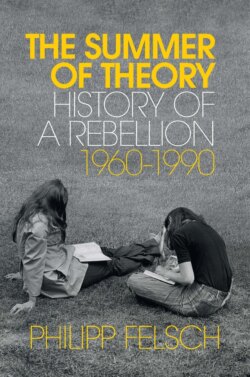Читать книгу The Summer of Theory - Philipp Felsch - Страница 16
Are Your Endeavours Aimed at Changing the World?
ОглавлениеPeter Gente did not seek Adorno’s help. In October of 1965, he wrote to him on a matter that was apparently purely philological:
Some weeks ago I read the special issue of the journal Sinn und Form on Hanns Eisler. The issue contained reprinted excerpts of Composing for the Films. I immediately borrowed that book and was quite perplexed. Did Eisler really write it? It reads like a digression from the Dialectic of Enlightenment, and yet the manuscript was allegedly completed as early as 1942! I suspect that you are the real author and would be grateful for confirmation. Please allow me to send you my best wishes and very warm regards.80
This tone of respectful distance is how a disciple addresses his master. Adorno’s answer betrays that he felt quite flattered: ‘As to your suspicions concerning the book Composing for the Films, you have guessed the truth. I believe I can say without doing Eisler any injustice that nine tenths of the book are mine and one tenth at most was written by him.’ The reason for leaving Adorno’s name off the title page, he hinted, was Joseph McCarthy’s campaign against supposed communists: in 1947, just before the book went to press, the House Un-American Activities Committee had begun its first hearing – against the brothers Hanns and Gerhart Eisler. ‘Under these circumstances’, Adorno explained, ‘I felt it was right not to declare my authorship, trusting that people who took an interest in my work would notice it in any case. After so many years, you are one of the first.’ In concluding, he asked Gente to treat his message as confidential, since ‘in the climate currently prevailing in our country, some people would naturally try to exploit the matter’.81
The heads of the Frankfurt School were anxious to keep their Marxist past under wraps, not least in order to avoid risking the disfavour of their American sponsors. For that reason, they long resisted the idea of a new edition of the Dialectic of Enlightenment, and purged their old texts of passages that contained echoes of class struggle.82 And that was the reason why Adorno was reluctant, in 1965, to be associated with Hanns Eisler, the recently deceased composer of East Germany’s national anthem, whose brother Gerhart, just on the other side of the Berlin Wall, was a high official in the Socialist Unity Party. Although he showed fewer reservations in this regard than Max Horkheimer, Adorno too tried to avoid the stigma of communist sympathies under the West German state. Not until May of 1969, shortly before his death, did Composing for the Films appear under his name, published by the direct-distribution press Zweitausendeins. Adorno exposed the book’s true authorship in an appendix. The letter to Gente in which he had done so four years earlier found its way into an editor’s afterword in the later Suhrkamp edition of Adorno’s complete works.83 Gente, by then the publisher of Merve and still an Adorno reader, was, of course, proud of that.
And yet, for all his overt veneration of the author, Gente’s intentions in formulating his letter had been quite critical. For in 1965, at the apex of his fame, Adorno’s moral authority was beginning to show signs of strain. The question whether the book on film music was really the product of Adorno’s pen concealed the unspoken suspicion that Adorno had foisted off his elitist, ultimately bourgeois aesthetics on the Marxist Eisler. Both Adorno and Eisler had lent their support to twelve-tone music since the 1920s; whoever had written the book in question went so far as to hold Schönberg’s progressive dissonances to be the only music appropriate to the medium of film. But there was an essential political difference, as the well-read Gente knew by that time, between Adorno’s and Eisler’s positions. Was the function of twelve-tone composition to liberate music – without regard for audiences’ tastes – from the myth of natural tonality? Or was its purpose grounded in the education of the revolutionary class? Adorno’s ‘Leninist listening’, as the novelist Rainald Goetz once called it, was reserved to the avant-garde.84 To Hanns Eisler, on the other hand, whose studies with Schönberg had not prevented him from composing a harmonious anthem for the Germany of his choice, musical progress must be subservient to the socialist society. Aesthetic elitism or music for the revolutionary masses: those were the choices. The book on film scoring took Adorno’s side – under Eisler’s name. Since the mid-sixties, however, that side had become politically suspect.85 Sooner or later, Gente’s subtle criticism would inevitably draw after it the crucial question that Adorno heard more and more often during the last years of his life. Just a few weeks after Gente’s letter, one of Adorno’s students in Frankfurt asked it straight out: ‘Dear Professor Adorno,’ says the letter of November 1965:
Our generation, or at least a part of it, is confronted with the harrowing experience of our parents having lived under National Socialism and failing to explain why they put up with it, except by saying there was nothing they could have done. Hence our reflections on what meaning philosophy has, what meaning it can have, for our practice. Is theory practicable or not? Are your endeavours aimed at changing the world?86
